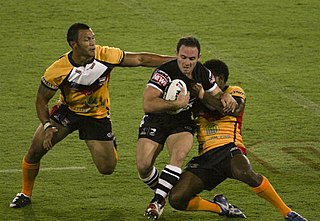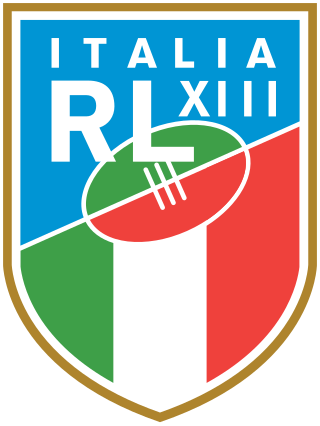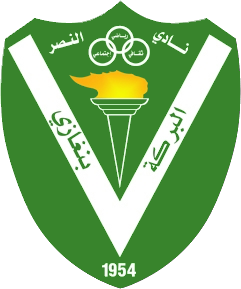Related Research Articles

Rugby union football, commonly known simply as rugby union in English-speaking countries and rugby 15/XV in non-Anglophone Europe, or often just rugby, is a close-contact team sport that originated at Rugby School in England in the first half of the 19th century. Rugby is based on running with the ball in hand. In its most common form, a game is played between two teams of 15 players each, using an oval-shaped ball on a rectangular field called a pitch. The field has H-shaped goalposts at both ends.

Rugby league football, commonly known as rugby league in English-speaking countries and rugby 13/XIII in non-Anglophone Europe, and referred to colloquially as football, footy, rugby, or league in its heartlands, is a full-contact sport played by two teams of thirteen players on a rectangular field measuring 68 m (74 yd) wide and 112–122 m (122–133 yd) long with H-shaped posts at both ends. It is one of the two major codes of rugby football, the other being rugby union.

Benghazi is the second-most-populous city in Libya as well as the largest city in Cyrenaica, with an estimated population of 859,000 in 2023. Located on the Gulf of Sidra in the Mediterranean, Benghazi is also a major seaport.
Touch is a variant of rugby league that is conducted under the direction of the Federation of International Touch (FIT). Though it shares similarities and history with rugby league, it is recognised as a sport in its own right due to its differences which have been developed over the sport's lifetime.

World Rugby is the governing body for the sport of rugby union. World Rugby organises the Rugby World Cup every four years, the sport's most recognised and most profitable competition. It also organises a number of other international competitions, such as the World Rugby Sevens Series, the Rugby World Cup Sevens, the World Under 20 Championship, and the Pacific Nations Cup.

The United Rugby Championship (URC) is an annual rugby union competition involving professional teams from Ireland, Italy, Scotland, South Africa, and Wales. For sponsorship reasons the league is known as the Vodacom United Rugby Championship in South Africa, and the BKT United Rugby Championship in the competition's other territories, the split branding mirroring the format previously adopted in Super Rugby. The Championship represents the highest level of domestic club or franchise rugby in each of its constituent countries.

The Libya national football team represents Libya in men's international association football and it is controlled by the Libyan Football Federation. The team has never qualified for FIFA World Cup but has qualified for editions of the Africa Cup of Nations in 1982, 2006, and 2012. In 1982, the team was both the host and runner-up. In the Arab Cup, Libya finished second in 1964 and 2012, and third in 1966. The team is affiliated with both FIFA and Confederation of African Football (CAF).

The Italy national rugby league team represents Italy in rugby league football. With origins dating back to the 1950s and 1960s, the team has competed regularly in international competitions since 2008, when their current governing body, the Federazione Italiana Rugby League, was formed. They are currently ranked 17th in the IRL World Rankings.

Al-Ahly Sports Cultural and Social Club, known as Al-Ahly SCSC, is a Libyan sports club based in Benghazi. Al-Ahly SC has its roots in a political party, the Omar al Mukhtar society.

Rugby Africa is the administrative body for rugby union within the continent of Africa under the authority of World Rugby, which is the world governing body of rugby union. As of 2018, Rugby Africa has 37 member nations and runs several rugby tournaments for national teams, including the Africa Cup which is the main 15-a-side competition for African national teams.

Al-Nasr Sports, Cultural and Social Club or simply Al-Nasr Benghazi is a Libyan professional football club based in Benghazi.

Samir Aboud is a retired Libyan footballer who played for Al-Ittihad as a goalkeeper. He was a member of the Libya national team.

AfroBasket 2009 was the 25th FIBA Africa Championship, played under the auspices of the Fédération Internationale de Basketball, the basketball sport governing body, and the African zone thereof. At stake were the three berths allocated to Africa in the 2010 FIBA World Championship. The tournament was hosted by Libya after Nigeria, the original host, withdrew from hosting after not conforming to FIBA Africa guidelines.
The 2008–09 Libyan Premier League season was the 42nd edition of the competition since its establishment in 1963. Al Ittihad were the defending champions, having won their fourteenth Libyan Premier League title with just one round of matches to spare in the previous season. The campaign began on Friday October 17, 2008, delayed due to Libya's World Cup qualifiers, and, depending on the Libyan Cup, is scheduled to finish on June 26, 2009. A total of 16 teams contested the league, including 13 who competed in the previous season and three promoted from the Libyan Second Division.

Al-Ahly Sports Cultural & Social Club, also known as Al-Ahly Ly or Al-Ahly Benghazi, is a Libyan basketball club that is based in Benghazi. Founded in 1950, the club competes in the Libyan Division I Basketball League and has won three championships, in 2010, 2011 and 2023.
The 2008–09 season is the 96th season of competitive football in Libya.

Anas Zniti is a Moroccan professional footballer who plays as a goalkeeper and captain for Botola side Raja CA and the Morocco national team. He previously played for Maghreb Fez and AS FAR.
Rugby union is a minor but growing sport in Cameroon. They were ranked 104th by the IRB as of August 2022.
Rugby union in Senegal is a moderately popular sport. The Senegal national team is currently ranked 54th by World Rugby.
Rugby union in Niger is a minor but growing sport.
References
- ↑ "Sports Enthusiasts in Libya Adopt the Game of Rugby". www.tripolipost.com. Archived from the original on 2011-07-17.
- ↑ unknown; found on the Internet. "Rugby and Islam, retrieved July 2nd, 2009".
{{cite web}}: CS1 maint: multiple names: authors list (link) - ↑ "Rugby takes hold in Libya | Confederation of African Rugby". carugby.com.
- ↑ "RUGBY IN LIBYA - Rugby Union News". www.heavensgame.com. Archived from the original on 2009-04-30.